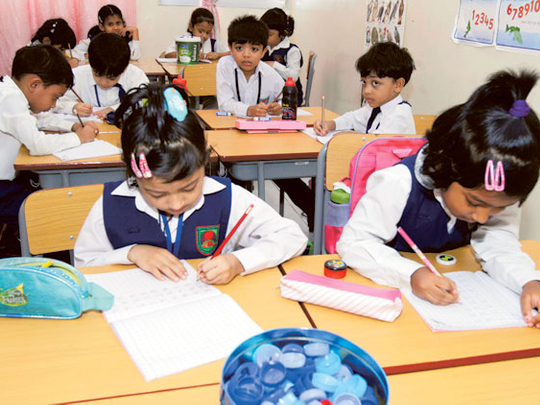
Abu Dhabi: Private schools in the emirate of Abu Dhabi are steadily showing improvement in their educational quality and overall performance, with only 44 per cent of schools ranked as needing improvement in the third round of school inspections.
This is in comparison with 66 per cent of schools, or 100 institutions, which were ranked in the same category, or Band C, during the previous round of Abu Dhabi Education Council (Adec) evaluations for private schools.
“This is a significant improvement, and the Irtiqa’a inspection system has boosted the process of continuous development,” said Hamad Al Daheri, executive director of private schools and quality assurance at the Adec.
He was speaking today (September 9) at a forum in the capital for private schools, which was attended by 380 school leaders.
About 225,000 pupils in the emirate currently attend private schools, and this number is growing at an average annual rate of 7 per cent.
One of the areas of focus at the forum was the third round of school inspections for the emirate’s 189 private schools, which began during the 2013-2014 academic year.
Schools are rated based on eight criteria, including pupils’ achievement and level of progress, pupils’ personal development, teaching and learning quality, meeting pupils’ needs within the curriculum, protection and guidance for pupils, quality of the schools’ buildings and premises, school resources and effectiveness of leadership and management.
Depending on performance, schools are then rated as High-performing (Band A), Satisfactory (Band B) or Needing Significant Improvement (Band C). These bands are themselves subdivided into a total of eight ranks, with Band A schools ranked as outstanding, very good and good, Band B divided into satisfactory and improving, and satisfactory, and Band C ranked as unsatisfactory, very unsatisfactory and poor.
During 2013-2014, 118 evaluations were conducted and 80 more inspections will be held during the ongoing academic year. Some large schools are inspected twice to cover all criteria, officials said.
Edward Murtaugh, manager of inspection and monitoring at the Adec, said that officials had found widespread improvements in a number of evaluation criteria, including teaching quality, leadership, and range of extracurricular activities.
As a result, 21 private schools had moved up a band, and 16 per cent are now classified as Band A schools while 40 per cent are Band B schools. This is compared to just 15 per cent of schools in Band A and 19 per cent of schools in Band B during the second inspection round that ended in 2012-2013.
Inspectors also noted a decline in performance in eight schools, which dropped by a band.
“This is a steady growth among schools, and it is certainly promising. But certain areas still require much improvement. For example, we found that the single most common reason why Band A schools failed to move from a grade of very good to outstanding was their lack of a strong Arabic language learning programme,” Murtaugh said.
Other challenges include providing consistently high teaching quality, and curriculum delivery in a manner that challenges pupils of all levels appropriately.












